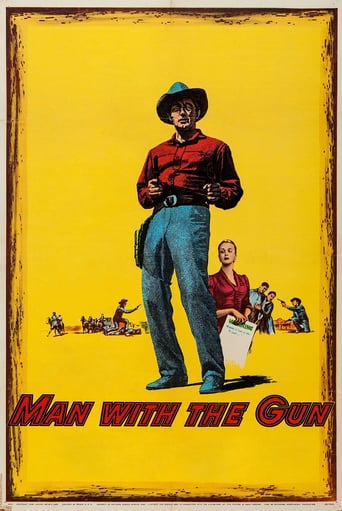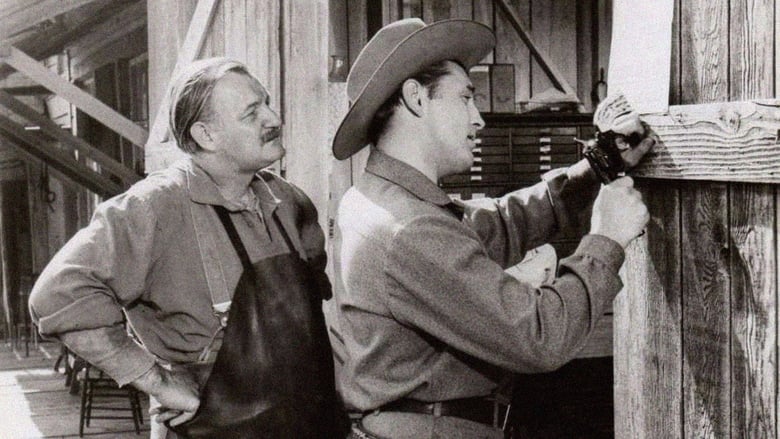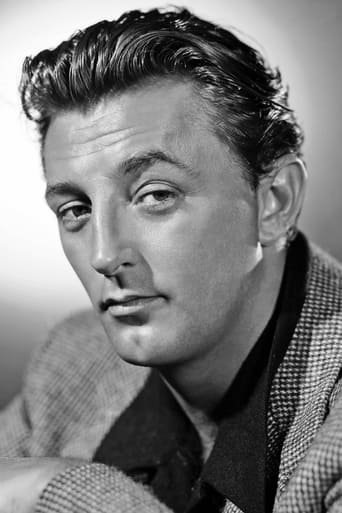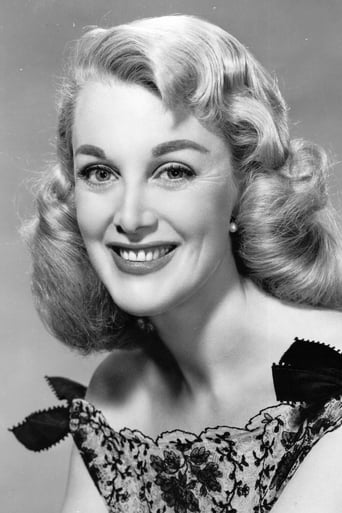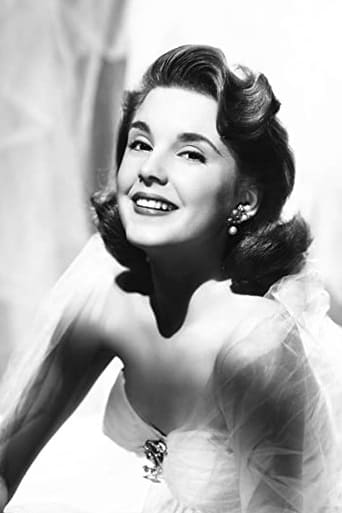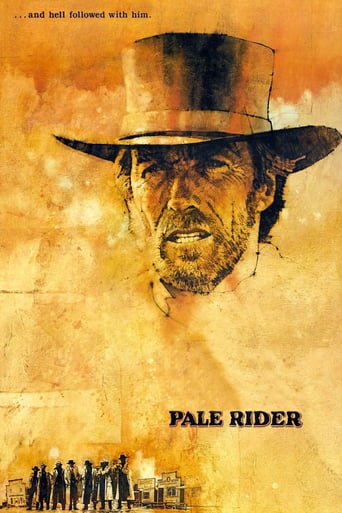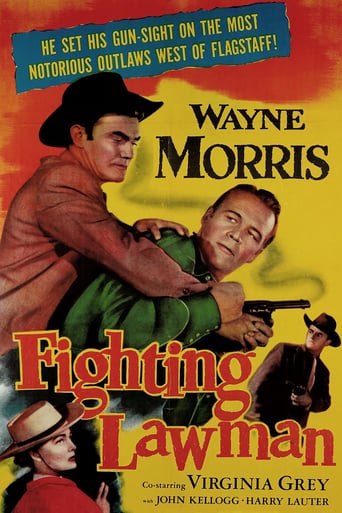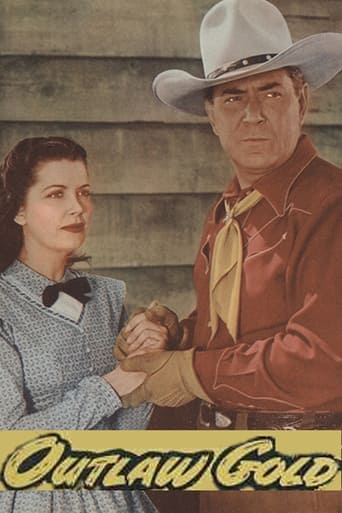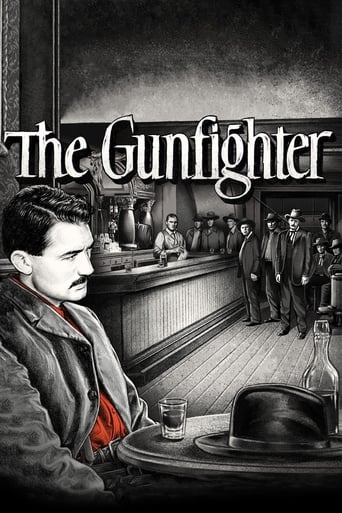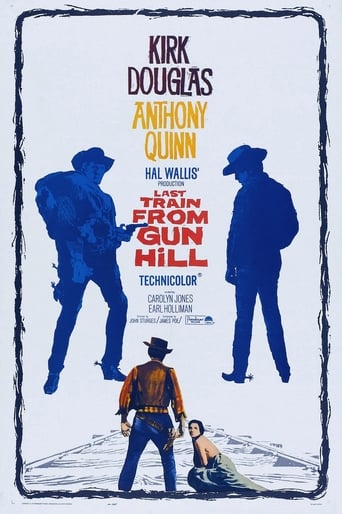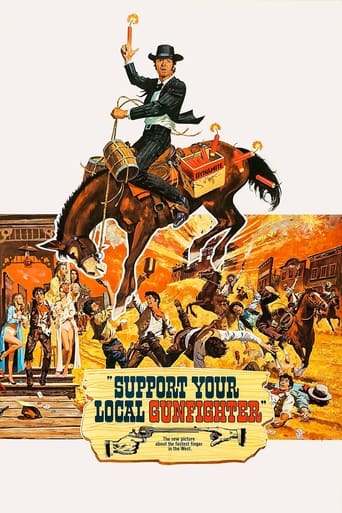Man with the Gun (1955)
A stranger comes to town looking for his estranged wife. He finds her running the local girls. He also finds a town and sheriff afraid of their own shadow, scared of a landowner they never see who rules through his rowdy sidekicks. The stranger is a town tamer by trade, and he accepts a $500 commission to sort things out.
Watch Trailer
Cast
Similar titles
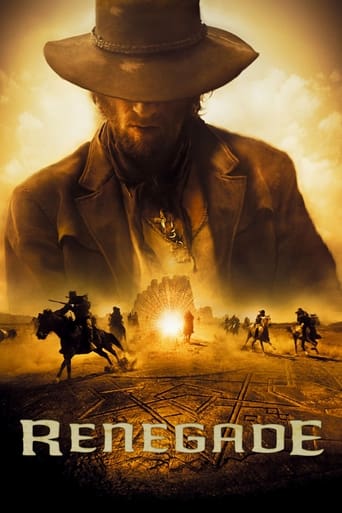
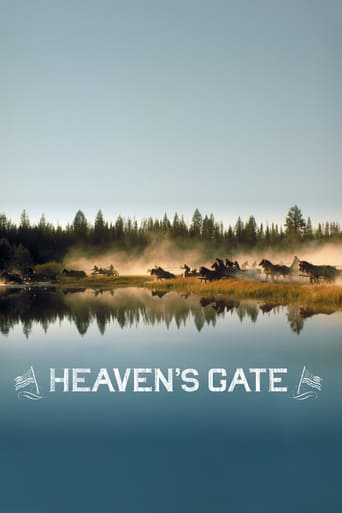
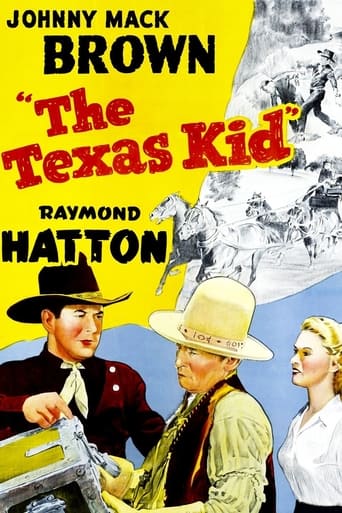
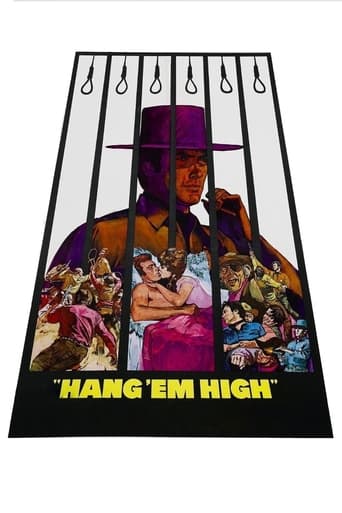
Reviews
Excellent, Without a doubt!!
Very interesting film. Was caught on the premise when seeing the trailer but unsure as to what the outcome would be for the showing. As it turns out, it was a very good film.
Wow! What a bizarre film! Unfortunately the few funny moments there were were quite overshadowed by it's completely weird and random vibe throughout.
The acting in this movie is really good.
This is yet another film based upon one of the classic Western plots, the one about the fearless lawman or gunman who helps the inhabitants of a town or a group of homesteaders stand up against a gang of lawless desperadoes, often in the pay of a corrupt local rancher or other powerful business interests. I have come to think of this as the "Dodge City" plot, after one of the earliest well-known films to feature it, but there are many other examples, including "My Darling Clementine", "Gunfight at the OK Corral" and the various other retellings of the Wyatt Earp story, "Destry Rides Again", "Shane", "High Noon", Howard Hawks' "Rio Bravo" (and its remakes) and several Clint Eastwood films such as "High Plains Drifter" and "Pale Rider". This film was originally released in the United Kingdom as "The Trouble Shooter", although when it turns up on British television these days it is generally referred to by its American title "Man with the Gun". (I understand that it is also sometimes known as "Deadly Peacemaker", making it a rare example of a film with three official titles). It is set in a nameless Western town which is being terrorised by a gang of gunmen hired by Dade Holman, a wealthy and powerful cattleman who hopes to force the local people out so he can acquire their property cheaply, and opens with a striking image of one of the bad guys shooting a little boy's dog in front of the child. The townspeople decide that enough is enough, and call in Clint Tollinger, a gun for hire with a reputation as a "town tamer". The film then narrates how Tollinger goes about his task. A complication is that Tollinger is the former lover (or possibly the former husband) of Nelly Bain, the manageress of the local "dance hall". This, in fact, appears to be a euphemism for the local brothel, but this is never spelt out clearly. Prostitution may have been a fact of life in the Old West, but in the fifties there were some facts of life which the censors insisted remain hidden from public view. Robert Mitchum made a number of Westerns throughout his career, although they were not always among his best films; he tended to be at his best in film noir, playing characters who were, if not outright villains like his Max Cady in "Cape Fear", at least morally ambiguous. He brings something of this quality to Tollinger, who is referred to as "the man in grey", the implication being that if he is not quite as black as the villains he is not as white as the driven snow either. Although he has been deputised by the town marshal, this is one film where the dividing line between an officially appointed lawman and a hired gun is a thin one. Tollinger has about him something of the ruthlessness which characterises his opponents, and his methods, such as setting fire to the town saloon, are not always ones which the law would sanction. The film does not, however, seriously call into question the "shoot first, ask questions later" philosophy of law enforcement in the way in which Michael Winner was later to do in his revisionist Western "Lawman". Tollinger may sometimes go over the top, but he is nevertheless the hero and his opponents are the bad guys. The film ends with the town well and truly tamed and the audience are left to conclude that peace and justice do indeed grow out of the barrel of a gun. In the fifties such a moral was not thought to be in any way exceptionable; indeed, it is a common philosophy in the cinema, and one not confined to the fifties or, for that matter, to Westerns. It is a philosophy which underlies just about every "tough cop" movie from "Dirty Harry" onwards, and most war films except those with an explicitly anti-war message. The trouble with "Man with a Gun", at least when seen from a modern perspective, is that it is likely to leave the viewer with a sense of déjà vu. In 1955 the "strong man with a gun" theme might have seemed slightly fresher than it does nowadays, but even then this film might have struck many people as an inferior imitation of "High Noon". Mitchum plays his part well, but none of the other acting contributions are particularly memorable, and this film is far from being the best on its particular theme; I would rate all those listed in my opening paragraph considerably higher. The basic plot became so well-known (and, indeed, such a cliché) that Mel Brooks chose it as the one to send up in his satirical spoof Western "Blazing Saddles". Richard Wilson's film strikes me as being the sort of thing that Brooks was aiming at. 6/10
This B+ western deserves a better grade just for exceeding its production values. The town's set is little better than that for TV westerns like Lawman, and the script works mostly by saying as little as possible, forcing the cinematography and direction to show rather than tell. The familiar stock character actors (including some familiar faces like Emile Meyer who rise to their extended screen-time) all support Mitchum, whose pained charisma and cobra-quick violence are essential to the film's success.Other reviewers are right that the basic plot is formulaic, but a few variations maintained interest. Meyer's daughter's gradual infatuation with Mitchum is never directly acknowledged by either character (only by townspeople), but the audience sees her putting herself in his company or staring after him or him sometimes looking back. The villain's spy who watches Mitchum from the hotel porch is obviously up to something, but the viewer is cleverly sealed off from the scenes that expose his plot.Two parts of the script instill suspense and dread that are honest to the story's ambiguous outcome. Twice the town doctor warns that a cure like that Mitchum is offering the town may be worse than the town's disease. Mitchum's character warns of no formulaic redemption when he repeatedly asserts that he's nothing but a gunman and only guns can tame a town—contrasting ominously with formula western heroes who proclaim they don't want to fight, that they're really peace-loving men. One other oddity at the end was Mitchum's taking a bullet so the younger man engaged to Meyer's daughter can prove his manhood. Mitchum's wound seems close to the heart; his and the doctor's initial conversation sounds fatal; and Mitchum reclines in profile like a fallen classical hero. Maybe the studio insisted on a proper romantic ending, though, for then Mitchum and his long-lost wife talk as though he'll hang up his guns and they'll start over, climaxing in a kiss at "The End." B movies like this count as precious jewels and fascinating records of mid-20c culture.
Clint Tollinger arrives in a small western town looking for his estranged wife, who left him and now runs the local show saloon. His presence is greeting by suspicion but when the town leaders discover the nature of Tollinger's business they propose that they employ him to clean up the town of the problem of Dade Holman's violent influence. The solution may be just as bad as the problem but they take the risk.With a nice dark character with a lot of anger and pain in the front of the film this western is enjoyable tough. Although the plot is fairly typical of a western b-movie, the tone and edge to it means that it comes over as much more. The basic story sees Tollinger taking on the rule of Holman but it has undercurrents of pain and anger as the lead confronts his wife. We meet Tollinger as a gentle, quiet man but gradually we see him to be violent, heartless and full of bitterness; it is solid development that is at the heart of the film's dark tone. Of course it still follows the genre traditions and will appeal to fans of such while also having enough else going on to make it differ from the Technicolor westerns of the same period.Wilson is responsible for the dark tone as both writer and director; shot is stark black and white he frames some interesting shots and is not afraid to be aggressive or shocking considering the period. Mitchum takes to his character well and always seemed to enjoy the darker more complex characters that some of his westerns would serve him up with. Sterling does well with her firm character until near the end where she becomes more of a genre staple. Support behind these two is roundly good but the film is very much Mitchum's and he knows it.Overall it is a solid western that gradually gets down to just going where you expect it to. However for the vast majority it has a dark tone and feel to it that makes it much more interesting and more likely to appeal beyond the limitations of those that like the colourful b-movie westerns of the period.
there should be a sub-genre in the Western called 'the Robert Mitchum Western'. Mitchum's brilliant, idiosyncratic, usually undervalued Westerns import his film noir persona to etch some compellingly dark character sketches, and bring an elegiac world-weariness more familiar from the films of Sam Peckinpah. 'Man with the gun' is one of his best. Directed by Orson Welles protege Richard Wilson, it is a stark, monochrome beauty, full of chilling silhouettes and terrifying outbursts of savage violence, as Mitchum comes to tame a town terrorised by a monopolist with a private army. Mitchum's regression from soft-spoken stranger to deranged murderer, with a host of dark emotions in between, is a marvel of expressive, physical acting.
